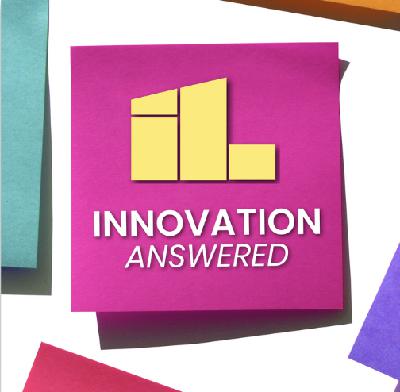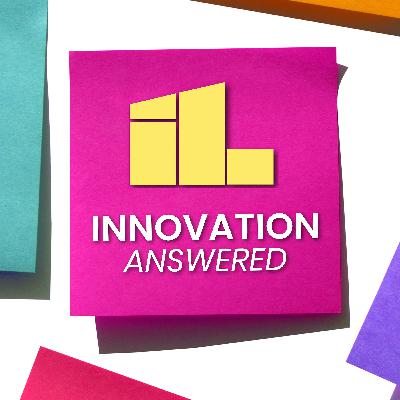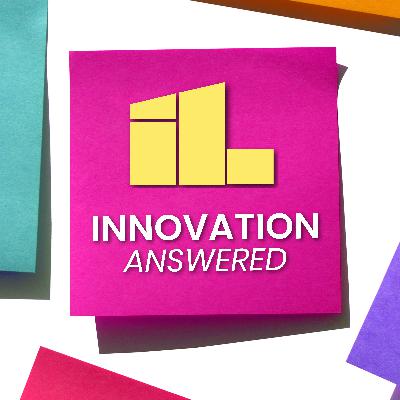Discover Innovation Answered
Innovation Answered

Innovation Answered
Author: InnoLead
Subscribed: 71Played: 1,190Subscribe
Share
© Innovation Leader
Description
Innovation at large, established companies is hard. So we made a podcast to help you overcome obstacles and create change at your organization. Welcome to Innovation Answered, the podcast for corporate innovators.
We've featured top leaders from companies like Walmart, Lyft, Google, Trek, Herman Miller, Anthem, Kellogg's, Wayfair, Royal Caribbean, FitBit, Lucasfilm, and CVS.
For more information and show transcripts, visit innovationleader.com/podcast/.
We've featured top leaders from companies like Walmart, Lyft, Google, Trek, Herman Miller, Anthem, Kellogg's, Wayfair, Royal Caribbean, FitBit, Lucasfilm, and CVS.
For more information and show transcripts, visit innovationleader.com/podcast/.
89 Episodes
Reverse
For the latest episode of our Innovation Answered podcast, we decided to do something experimental. We're leveraging all of the AI tools that can possibly help us create a podcast episode — and using them to summarize some of our best content from 2024, and also hone in on some of the important dynamics that will impact corporate innovation work in 2025. We deployed ChatGPT, of course, but also Suno, Google's NotebookLM, and ElevenLabs to clone the voices of episode co-hosts Scott Kirsner and Alex Slawsby. (And we comment on and criticize their outputs as we go.)
In this episode, we talk with Bob Weis, the former President of the legendary Imagineering division at Disney and author of the new book, Dream Chasing: My Four Decades of Success and Failure with Walt Disney Imagineering. If you've been to a Disney theme park, resort, or cruise ship recently, you've experienced Weis' work. He has helped design theme parks in Tokyo, Shanghai, and Orlando, and he also had a hand in rethinking the California Adventure theme park in Anaheim after it got off to a rough start. We talk about the origins of Imagineering under Walt Disney; why it's important that it's not located at Disney's HQ campus; how they've worked with different Disney CEOs; how Weis views competition; his work outside Disney as a consultant; and a whole lot more. Weis will be sharing his perspective on creativity and innovation at InnoLead's Impact conference in Boston this October.
In this episode, we connect with Dr. Sokwoo Rhee, EVP of Innovation at LG Electronics and Head of the LG Nova Innovation Center in Silicon Valley. We talk about Dr. Rhee's past as an entrepreneur and Presidential Innovation Fellow, and also the goals of LG Nova — collaborating with startups and new partners, and making investments. Two areas of interest: healthcare and cleantech. Dr. Rhee also serves up advice about getting (and keeping) the backing of senior leaders.
In this episode, we talk to Laura Northridge, Senior Director of the AI Innovation Lab — previously just the "innovation lab" — at Harvard Business Publishing. As is the case with many corporate innovators, she's helping shape AI strategy and policy for the Boston-based nonprofit, an affiliate of Harvard Business School. It's one of small number of organizations we've been tracking where the innovation lab shifted its focus entirely to AI earlier in 2024. Harvard Business Publishing is best known for the Harvard Business Review — in print and online — but it also publishes business books, learning materials, and the famous Harvard Business School case studies.
In this episode, we talk with Steve Blank about why celebrating innovation heroes is symptomatic of a problem in large organizations. Steve is a serial entrepreneur, author, and educator and leading advocate for the methodology of customer development and the lean startup approach. In a recent Substack piece, Blank writes about an innovation awards ceremony he attended at a government agency: "I'm constantly puzzled why thoughtful and astute CEOs and agency directors never asked, why is it that innovations require heroics to occur in our organization? Why don't we have a repeatable process for innovation? What are the obstacles in the way of delivering needed innovation with speed and urgency in our organization? And why is it that after each one of these [innovation] awards we give out, we don't go back and fix the parts of the system that made creating something new so difficult?" Blank talks about the role of senior leaders, and the concept of an innovation doctrine. And he touches on the significance of AI: "I think this is as important as anything we've seen in tech in probably the last 50 years," he says.
In this episode, we talk about generative AI, speech interfaces, and evolving the customer experience for one of the world's top luxury car brands: Mercedes-Benz. At the Consumer Electronics Show earlier this year, Mercedes made a major splash with a new virtual assistant that leverages advanced software and generative AI — along with on-screen visuals — to provide more proactive support and a more intuitive way of interacting with the vehicle. One of the people behind that project is James Liu, the head of customer experience for the Mercedes-Benz operating system. "I always joke with my team that we're the last layer of light and sound waves between all of our technologies and the customer," Liu says. "Practically speaking, my teams are responsible for HMI concept, UX design, front-end engineering, speech, and the AI platform."
We talk AI, employment disruption, UBI, corporate innovation, and the future of the automotive industry with Evangelos Simoudis, an author, investor, and advisor based in Silicon Valley. At Synapse Partners, he invests in early-stage startups that develop enterprise software and AI applications and also advises big companies and governments on the use of data and AI to address strategic problems. "This is not the first time that we've seen this bringing together of both anxiety and excitement" around AI, Simoudis says. "My perspective is colored by the fact that I've seen three other AI springs, as I call them. ...I will say that the optimist in me sees advancements in every one of these AI springs." Simoudis is also the author of several books, including Transportation Transformation and The Flagship Experience, published in late 2023. He is also a close observer of the corporate innovation and startup ecosystems in Silicon Valley, and he writes a blog called "Re-Imagining Corporate Innovation with a Silicon Valley Perspective."
From six years spent at Starbucks to designing a new countertop coffeemaker that cranks out cold brew, Mesh Gelman has been working at the cutting edge of coffee. During his time at Starbucks, he witnessed the rising popularity of cold beverages, a trend that his new startup, Cumulus Coffee Company, aims to capitalize on. In this podcast episode, we talk with Gelman about coffee trends; developing a new product from scratch; the difference between big organizations and start-ups; and his past work as an innovation consultant.
In this episode, we catch up with Geoffrey Moore, the best-selling author, consultant, and venture capitalist whose groundbreaking work has shaped how we think about innovation strategy. If you've ever talked about a technology "crossing the chasm" from the realm of early adopters into the early majority, or your company has put a high potential project into the incubation zone, you've been using language given to us by Moore. His best-selling books including Zone to Win, Inside the Tornado, and Crossing the Chasm — and lately, he's been publishing a series of insightful LinkedIn articles on topics including the future of the office…rethinking personalization… and why it's time to stop talking about generative AI and start doing something with it. Listen to the episode to hear the full conversation.
In this episode, we talk about the challenges of innovating in biopharma with a veteran of that industry, Dan Seewald. Seewald is the former Head of Worldwide Innovation at Pfizer, the $100 billion pharma giant headquartered in Manhattan, and now the founder and CEO of the consulting and training firm Deliberate Innovation. Among the questions that InnoLead CEO Scott Kirsner covers with Seewald: How do you create space for new ideas in a regulated industry? What's your advice on exploring the potential of AI? How do you effectively communicate an internal innovation initiative? How do you deal with all of the legal and compliance colleagues who are very good at saying "no" to new ideas? What he'd do differently if he was starting over at Pfizer. This episode was hosted by Scott Kirsner and edited by David Swope.
Who's leading the charge on generative AI in big organizations? How are they managing the tension between moving quickly and not making major missteps? And what use cases are they moving forward with? In this episode, we dive into the rapidly-evolving world of generative AI with Paul Baier, the CEO and co-founder of GAI Insights. Baier talks about the vendor landscape and shares several examples of first-mover companies, including McDonald's and Walmart, that are making strides in deploying generative AI. You can subscribe to our podcast, "Innovation Answered," on Spotify, iTunes, Stitcher, or Google Podcasts. Scott Kirsner hosts this episode; Hadley Thompson produced it.
"For too long," says Todd Dunn, "many organizations have not developed innovation as a strategic and ongoing source of competitive advantage. Instead, some organizations have used it for reputational points in the public eye, but not to deliver measurable value to consumers, customers and the company." That's a big problem, argues Dunn, who was most recently the Vice President of Enterprise Innovation at Advocate Health. Advocate is headquartered in Charlotte, NC, and it's the fifth biggest nonprofit health system in the US. In this episode, we talk with Dunn about what went wrong in Act 1 of corporate innovation — and what needs to change in Act 2. Our discussion was sparked by Dunn's recent LinkedIn piece, "Innovation: The Driving Force of Competitive Advantage." You can subscribe to our podcast, "Innovation Answered," on Spotify, iTunes, Stitcher, or Google Podcasts. Scott Kirsner hosted this episode, and Hadley Thompson produced.
Design thinking is a well-known concept in the innovation sphere — it often comes up in conversation, at conferences, or in passing. But for as much as people talk about design thinking, not everyone understands its full scope — and even fewer people use it in their day-to-day work. To help bridge the gaps, we created this "beginner's guide" podcast. For this episode, we wanted to ask some basic questions about what design thinking is, how non-experts can get up to speed, the challenges experts have seen when introducing it to others, and how it can help come to viable solutions. We chatted with Prapti Jha, a Strategist and Researcher at Harvard's T.H. Chan School of Public Health; Scott Wolfson, Senior Strategy Director at BCG BrightHouse; and Craig Damlo, Senior Manager at Blue Origin, to get the answers. You can subscribe to our podcast, "Innovation Answered," on Spotify, iTunes, Stitcher, or Google Podcasts. Tyler Smith hosted and produced this episode.
This bonus episode of "Innovation Answered" features Matt Baker, Head of Corporate Strategy at Dell Technologies. AI has generated so much interest with the release of ChatGPT; the announcements from Google, Baidu, Microsoft, and Alibaba about chatbots and generative AI; and increased adoption of art-focused AI platforms like DALL-E and Midjourney. So we decided to explore the basics and background of the technology — and what happens next. This episode focuses on what AI is; generative AI; how it could affect jobs going forward; and how large companies' adoption of AI may create competitive advantage or disadvantage. Our "beginner's guide" podcast episodes take on important topics at the 101 level, without jargon or complexity, assuming that you may be new to the job of making innovation and change happen inside a big organization. We want to make things crystal clear, so you can get down to business. This episode is hosted and produced by InnoLead's Tyler Smith.
In this episode, we'll dive into four questions: what is an innovation space? What are the pros and cons of physical versus virtual spaces, what are the qualities great spaces possess... and what common mistakes do people make in setting them up and running them. For expert perspective, we consult Michelle Cohen of CME Group, Andy Miller of AARP, and Michael Cross of Entergy. Our "beginner's guide" podcast episodes take on important topics at the 101 level, without jargon or complexity, assuming that you may be new to the job of making innovation and change happen inside a big organization. We want to make things crystal clear, so you can get down to business. This episode is hosted and produced by InnoLead's Tyler Smith.
In our Persistent Innovators miniseries, InnoLead and Wade Roush explored the cultures of four large companies that have pushed the innovation envelope for decades: Disney, Apple, Lego, and Novartis. But who else deserves recognition? From making pizza ever more convenient at Domino's, to finding new markets at FujiFilm, we dissect the practices and strategies at six more persistently-innovative companies, with input from guests like Bill Taylor, Braden Kelley, and Rita McGrath. Special thanks to our friends at PatSnap and Innovation Academy for sponsoring this miniseries.
How do big companies stay innovative across many decades, and in different industries? That's been the driving question of our Persistent Innovators miniseries. In the fourth and final episode we turn to company in a very different kind of business: discovering and developing new drugs. And we focus on the global pharmaceutical giant Novartis, formed in 1996 from the merger of the venerable Swiss companies Sandoz and CIBA-Geigy. At its Novartis Institutes for BioMedical Research, opened in 2002, Novartis invented a new style of biology-centric drug discovery that has changed practices across the industry—and sparked a local biopharma boom that has utterly transformed the Kendall Square neighborhood of Cambridge. Compared to the other industries we've covered in the miniseries, namely digital devices (Apple), entertainment (Disney), and toys (LEGO), the pharmaceutical business is downright cutthroat. Product development is risky, time-consuming, and expensive; competition is incredibly fierce; and even a blockbuster drug can become a flop once the patent expires and a generic drug makers jumps in. On top of all that, drug makers have to operate outside the traditional world of consumer marketing: You take a Novartis medicine not out of any brand loyalty to Novartis, but because your doctor tells you to. The net effect is that to stay successful, a big drug company must keep their product pipelines full and churn out hit after hit—which, when you think about it, is the very definition of a persistent innovator. In this episode, former Novartis executive and drug hunter Tom Hughes explains how Novartis's first CEO decided to rebuild the company's drug discovery effort around a genomic and molecular understanding of disease. And current NIBR president Jay Bradner talks about the structures Novartis has set up to protect and promote high-output innovation. Finally, we speak with Sam Wiley, head of thought leadership and customer advocacy at PatSnap—our sponsor throughout the miniseries—about a few more companies he sees as persistent innovators. Special thanks to our friends at PatSnap and Innovation Academy for sponsoring this miniseries.
LEGO is one of the world's most famous and admired brands. The company's colorful plastic bricks are the literal building blocks of an empire that spans a $5 billion annual toy business, hundreds of retail stores, 10 theme parks, and a series of hit movies. But what LEGO actually sells isn't just the bricks, it's a whole system of play: an endlessly expandable way for children (and adults) to combine hand, eye, and imagination. It was when product developers drifted away from that system in the 1990s and early 2000s—introducing a blizzard of toy lines that didn't use the bricks at all—that LEGO stumbled into serious trouble. The company had a close brush with bankruptcy in 2003, then grappled its way back to profitability by refocusing on its core customers and their passion for building things. For this third episode of our Persistent Innovators miniseries, guest host and producer Wade Roush sought out LEGO experts like journalist Bill Breen—co-author of the authoritative LEGO history Brick by Brick—as well as former LEGO executives Robert Rasmussen (developer of the LEGO Serious Play method) and David Gram (founder of the consulting firm Diplomatic Rebels). They explain what went wrong at LEGO, how the company rediscovered the spirit of play that make its toys so beloved, and what it does today to make sure that innovation doesn't stray too far outside the brick. The Persistent Innovators is sponsored by Patsnap (www.patsnap.com), the Connected Innovation Intelligence company, and by Patsnap's online courseware site Innovation Academy (academy.patsnap.com).
Disney isn't the world's largest media company—that title goes to Comcast. But it's probably the one that has burrowed the deepest into our psyches. As it approaches its 100th birthday in 2023, The Walt Disney Co. not only dominates in its original field of feature animation, but also operates some of the world's most famous film studios (Pixar, Marvel, Lucasfilm, 20th Century, Searchlight), television and streaming networks (ABC, ESPN, National Geographic, Hulu, Disney+), and theme park resorts. And to generate the content and experiences that power all of those properties, it marries the latest media technologies with storytelling at a level few other companies can match. And yet Disney hasn't delivered with perfect consistency. In the second episode of our Persistent Innovators miniseries, guest host and producer Wade Roush talks with former executives from Disney's feature animation, Imagineering, and parks and resorts divisions, and digs into the company's innovation secrets, as well as a few rare but illustrative moments when Disney stumbled—and rebounded. The Persistent Innovators is sponsored by Patsnap (www.patsnap.com), the Connected Innovation Intelligence company, and by Patsnap's online courseware site Innovation Academy (academy.patsnap.com).
If you want to understand how some large organizations manage to keep innovating, decade after decade, you need to study the companies that actually do that. And Apple is at the top of the list. Thanks largely to sales of its world-conquering iPhone, it recently became the first company in the world to reach a $3 trillion market capitalization. But Apple's journey toward "persistent innovator" status started long before the iPhone's introduction in 2007. In this first episode of our Persistent Innovators miniseries, guest host and producer Wade Roush travels back to the 1980s and 1990s, to talk with people who worked alongside Steve Jobs and Steve Wozniak and saw how leadership, culture, and technology came together to make Apple…Apple. The Persistent Innovators is sponsored by Patsnap (www.patsnap.com), the Connected Innovation Intelligence company, and by Patsnap's online courseware site Innovation Academy (academy.patsnap.com).








